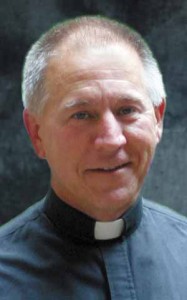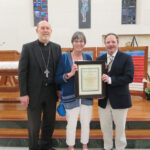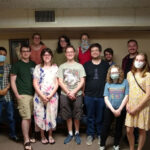By Fr. Bud Grant
In last month’s article I reviewed the development of environmental moral theology through the “social encyclicals” that began with Rerum Novarum in 1891. What began as a concern for the just distribution of resources has grown to an ethic of wise use of natural resources with particular preference for the world’s marginalized people and for preserving resources for future generations. With St. John Paul II, a glimmer of an expanded viewpoint began to emerge: that nature is God’s creation and, as such, it has intrinsic (not only instrumental) value.

There is no inherent contradiction between this ecocentric perspective and the anthropocentric “earth-as-resources” point of view. But it does emphasize a biblical and natural law theology that had heretofore been neglected: the earth is God’s and we are merely its stewards. “In recent decades,” says Pope Benedict XVI, “the doctrine of Creation has almost disappeared in theology … we are now aware of the damage that this has caused” (Aug. 6, 2008). Indeed, balancing these two ways of thinking about nature (as creation and as resources) is the hallmark of the one whom secular press has dubbed “the Green Pope” (c.f. Huffington Post, Feb. 11, 2013).
It would take a book to document all of his teachings (in fact, there is one: “The Environment,” 2012) but we can highlight a few points. “In nature,” he says in Caritas in Veritate, “the believer recognizes the wonderful result of God’s creative activity, which we may use responsibly to satisfy our legitimate needs, material or otherwise, while respecting the intrinsic balance of creation. If this vision is lost, we end up either considering nature as an untouchable taboo, or, on the contrary, abusing it. Neither attitude is consonant with the Christian vision of nature as the fruit of God’s creation” (48).
Is it clear that the Holy Father values both the anthropocentric and the ecocentric concerns? We legitimately use nature’s resources but we also have to care for nature for its own sake. His emphasis on this double theme is consistent. In his 2007 World Day of Peace address he spoke about the “ecology of nature” and “what can be called a human ecology … a social ecology” (8). For Benedict, the social ecology demands that the poor and future generations receive our environmental ethical consideration, while the “ecology of nature” obliges us to the earth itself (World Day of Peace, 2008, Caritatis in Veritate 50). But he isn’t done yet. In his own words, “however, a difficult question remains, one I cannot answer at length at this moment: why was it necessary to suffer to save the world? It was necessary because … God cannot ignore the cries of the suffering who are oppressed by injustice … we ourselves, with our whole being, must be adoration and sacrifice, and by transforming our world, give it back to God … to consecrate the world so that it may become … a liturgy” (homily for Vespers, Aosta July 24, 2009). We have come full circle: to care about God’s creation requires what Leo XIII also demanded: justice. We may call it “redistributive suffering,” that is, since ecological suffering is a reality, those who benefit the most — and suffer least — should shoulder a greater share of the burden for the sake of the poor, the future, and for the earth itself.
Yet the difficult question remains. We don’t yet know what Pope Francis’ encyclical will say, but he has already added to the conversation. St. John Paul II’s stewardship is amplified as “protection,” Benedict’s “human ecology” exposes the “idolatry of profit and consumption” and environmental exploitation is “our sin” (UN World Environment Day, June 5, 2013; The Atlantic, June 11, 2014). Look for him to emphasize the suffering of the world’s marginalized who pay the price of our ecological destructiveness. Look for him to challenge those of us who live comfortably in the economies which benefit most from these practices. Look for him to evoke the passion of Christ as our model of salvific suffering for the sake of creation itself.
(Father Bud Grant is a professor of theology at St. Ambrose University in Davenport.)











